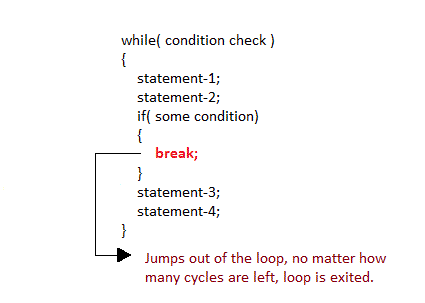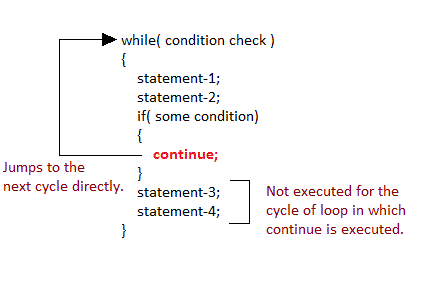Loop Control Statements
Sometimes, while executing a loop, it becomes necessary to skip a part of the loop or to leave the loop as soon as certain condition becomes true. This is known as jumping out of loop.
break statement :-
The break statement in C programming has the following two usages −
When a break statement is encountered inside a loop, the loop is immediately terminated and the program control resumes at the next statement following the loop.
It can be used to terminate a case in the switch statement
If you are using nested loops, the break statement will stop the execution of the innermost loop and start executing the next line of code after the block.
flow :-

int main () {
/* local variable definition */
int a = 10;
/* while loop execution */
while( a < 20 ) {
printf("value of a: %d\n", a);
a++;
if( a > 15) {
/* terminate the loop using break statement */
break;
}
}
return 0;
}
/* local variable definition */
int a = 10;
/* while loop execution */
while( a < 20 ) {
printf("value of a: %d\n", a);
a++;
if( a > 15) {
/* terminate the loop using break statement */
break;
}
}
return 0;
}
int main(){
int i=1;//initializing a local variable
//starting a loop from 1 to 10
for(i=1;i<=10;i++){
printf("%d \n",i);
if(i==5){//if value of i is equal to 5, it will break the loop
break;
}
}
return 0;
}
int i=1;//initializing a local variable
//starting a loop from 1 to 10
for(i=1;i<=10;i++){
printf("%d \n",i);
if(i==5){//if value of i is equal to 5, it will break the loop
break;
}
}
return 0;
}
continue statement :-
The continue statement in C language is used to continue the execution of loop (while, do while and for). It is used with if condition within the loop.
In case of inner loops, it continues the control of inner loop only.
It causes the control to go directly to the test-condition and then continue the loop process. On encountering continue, cursor leave the current cycle of loop, and starts with the next cycle.
In case of inner loops, it continues the control of inner loop only.
It causes the control to go directly to the test-condition and then continue the loop process. On encountering continue, cursor leave the current cycle of loop, and starts with the next cycle.
flow :-

int main () {
/* local variable definition */
int a = 10;
/* do loop execution */
do {
if( a == 15) {
/* skip the iteration */
a = a + 1;
continue;
}
printf("value of a: %d\n", a);
a++;
} while( a < 20 );
return 0;
}
/* local variable definition */
int a = 10;
/* do loop execution */
do {
if( a == 15) {
/* skip the iteration */
a = a + 1;
continue;
}
printf("value of a: %d\n", a);
a++;
} while( a < 20 );
return 0;
}
int main(){
int i=1;//initializing a local variable
//starting a loop from 1 to 10
for(i=1;i<=10;i++){
if(i==5){//if value of i is equal to 5, it will continue the loop
continue;
}
printf("%d \n",i);
}//end of for loop
return 0;
}
int i=1;//initializing a local variable
//starting a loop from 1 to 10
for(i=1;i<=10;i++){
if(i==5){//if value of i is equal to 5, it will continue the loop
continue;
}
printf("%d \n",i);
}//end of for loop
return 0;
}
Output :-
1
2
3
4
6
7
8
9
10
As you can see, 5 is not printed on the console because loop is continued at i==5.
As you can see, 5 is not printed on the console because loop is continued at i==5.
goto statement :-
The goto statement is known as jump statement in C language. It is used to unconditionally jump to other label. It transfers control to other parts of the program.
It is rarely used today because it makes program less readable and complex.
It is rarely used today because it makes program less readable and complex.
int main() {
int age;
ineligible:
printf("You are not eligible to vote!\n");
printf("Enter you age:\n");
scanf("%d", &age);
if(age<18)
goto ineligible;
else
printf("You are eligible to vote!\n");
return 0;
}
int age;
ineligible:
printf("You are not eligible to vote!\n");
printf("Enter you age:\n");
scanf("%d", &age);
if(age<18)
goto ineligible;
else
printf("You are eligible to vote!\n");
return 0;
}
int main () {
/* local variable definition */
int a = 10;
/* do loop execution */
LOOP:do {
if( a == 15) {
/* skip the iteration */
a = a + 1;
goto LOOP;
}
printf("value of a: %d\n", a);
a++;
}while( a < 20 );
return 0;
}
/* local variable definition */
int a = 10;
/* do loop execution */
LOOP:do {
if( a == 15) {
/* skip the iteration */
a = a + 1;
goto LOOP;
}
printf("value of a: %d\n", a);
a++;
}while( a < 20 );
return 0;
}
Previous Next
Trending Tutorials
Review & Rating
0.0 / 5
0 Review
5
(0)
4
(0)
3
(0)
2
(0)
1
(0)
 What is C
What is C 